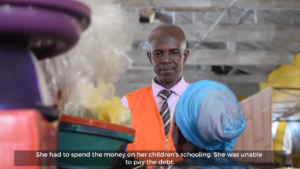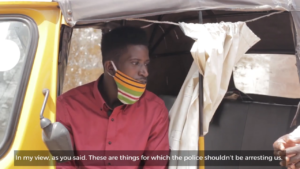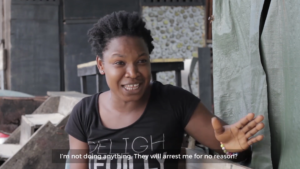In 2017, the Commission identified the criminalisation of petty offences, defined as “minor offences for which the punishment is…a warning, community service, a low-value fine or short term of imprisonment, often for failure to pay the fine…”[1]
Through the OSIWA project implemented by AdvocAid and CARL, AdvocAid paralegals carried out various interviews to get individuals’ understanding of the different types of petty offences in Sierra Leone. These interviews were converted into a series of videos that specifically address and discuss some petty offences in Sierra Leone and can be found here.
In these videos, staff from AdvocAid and CARL shared their thoughts on petty offences pointing out the types of petty offences such as loitering, minor traffic offences and nonpayment of small amounts of debt or money owed. They also talk about the discriminatory nature and impact of these offences which are not clearly defined and disproportionately affect women and girls.
There are many types of petty offences but only three were discussed in these short videos, such as:
Non-Payment of Debt
Most women borrow money to purchase supplies for most of their petty trade businesses but due to family responsibilities and other barriers they are at times unable to pay back creditors in time. Instead of using civil dispute resolution channels available in the justice system, creditors tend to report matters to the police and this results in many women being arrested for fraudulent conversion and obtaining goods by false pretences.
 The offences of fraudulent conversion and obtaining goods/money by false pretences are often wrongly applied to civil debt matters, criminalising the non- payment of debt without fraudulent intent indirectly discriminating the poor and vulnerable. The criminalization of non-payment of debt that occurs under S. 20(1) (iv) (b) and S. 32 of the Larceny Act 1916, and the indirect discrimination that this law has on those in poverty, are explicit breaches of human rights (Art. 11 International Covenant on Civil and Political Rights, Art. 2 and 3 of African Charter) and s.27 of the Sierra Leone Constitution.
The offences of fraudulent conversion and obtaining goods/money by false pretences are often wrongly applied to civil debt matters, criminalising the non- payment of debt without fraudulent intent indirectly discriminating the poor and vulnerable. The criminalization of non-payment of debt that occurs under S. 20(1) (iv) (b) and S. 32 of the Larceny Act 1916, and the indirect discrimination that this law has on those in poverty, are explicit breaches of human rights (Art. 11 International Covenant on Civil and Political Rights, Art. 2 and 3 of African Charter) and s.27 of the Sierra Leone Constitution.
Minor traffic offences
Minor traffic offences are among the most common petty offences in Sierra Leone. The inconsistent and discretionary application of sanctions under the Road Traffic Act 2007 and its consequential discrimination against poor and marginalized individuals clearly breaches human rights protecting a person’s liberty and freedom from discrimination under the African Charter (Art. 6) and the Sierra Leonean Constitution (incl. s.17). The interviews carried out highlight that most keke(tricycle) and motorbike riders have limited or no knowledge about the laws governing these offences.
The punishments often are disproportionate to the offences being committed with some even having their motorbikes and tricycles confiscated. These laws also lack clear sentencing guidelines which leaves them open to inconsistent and discriminatory application. This is particularly the case for individuals who are poor, vulnerable, part of a key population, or on account of their gender, age or disability.
Loitering
Most people are unaware that they can be arrested for loitering simply because they stand or walk a street in Sierra Leone for no good reason. This law is vague and open to abuse by law enforcement officials especially S. 7 Public Order Act and S. 13(1) (e) Criminal Procedure Act which allows discriminatory application, are contrary to the rule of law, and breach human rights laws regarding the freedom of movement and association (incl. Article 5 and 6 of the African Charter) and the Sierra Leone Constitution (incl. s.17, 20, and 21).
The laws that relate to petty offences, and the ways in which these laws are enforced, have many human rights, social and economic implications therefore AdvocAid and CARL call on the Government of Sierra Leone to decriminalise and declassify loitering offences and non-payment of debt offences respectively and to reform sanctions for minor traffic offences. The reform of petty offences is needed to enable Sierra Leone to comply with its obligations under the African Commission’s Principles, other international and regional human rights standards and the Constitution of Sierra Leone.
Interested in learning more about petty offences? Here are some resources:
Petty Offence Infographic Video
Petty Offences Campaign Graphics
For more information, please contact:
Rhiannon Davis, Executive Director, AdvocAid.
Ibrahim Tommy, Executive Director, Centre for Accountability & Rule of Law (CARL).
References
[1] African Commission on Human and Peoples’ Rights, Principles on the Decriminalisation of Petty Offences, 2018, https://www.achpr.org/legalinstruments/detail?id=2
